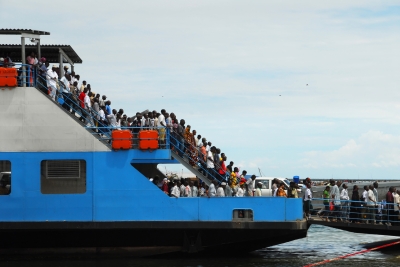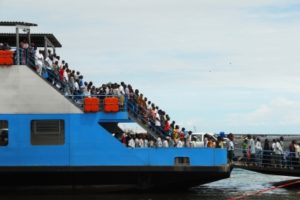The Maritime Industry Authority (Marina) has put an age cap of 20 years on passenger vessels to be imported into the Philippines as part of the agency’s move to modernize the Philippine domestic fleet.
Marina Memorandum Circular (MC) No. 2017-04 “aims to provide guidelines on the importation of passenger ship in order to ensure the continued viability of domestic shipping operations and to encourage the development of a viable shipbuilding and ship repair industry.”
The goal, it added, is “to support the expansion and modernization of the Philippine domestic merchant marine fleet and its strict adherence to safety standards which will ensure the seaworthiness of all sea-borne structures.”
The circular took effect on July 13 but was published in the newspaper of general circulation only on August 15.
The new policy covers all persons, corporations, partnerships, firms, and entities importing passenger ships intended for domestic shipping.
Under the requirements, passenger ships to be imported under MC 2017-04 should not weigh less than 500 gross tonnage (GT) and should not be more than 20 years old upon filing of application.
“A day more than the maximum age required in the importation of the ship shall be more than the required maximum age requirement, hence, importation will no longer be allowed,” it added.
Meantime, fast craft of less than 500 GT may still be imported pending another policy to be issued by Marina specifically for such vessels.
Ship restructuring or rebuilding does not change the ship’s age, MC 2017-04 explained. Plans to construct, convert, alter, modify, or rebuild all ships covered by the memo will be pre-evaluated by Marina before it issues the Authority to import.
Passenger ships covered by MC 2017-04, whether newly built or previously owned, must be classed by the Internationally Accredited Classification Society (IACS) at the time of importation.
Imported passenger ships should also be “in an acceptable condition, without outstanding recommendations, as shown in the latest survey report prepared by a marine surveyor authorized by the Administration or by the government of the country of origin of the ship.”
The ship’s condition also has to be verified or confirmed by an actual survey by Marina to be conducted after the release of the ship from the custody of the Bureau of Customs.
For second-hand passenger ships, they will be subjected to ultrasonic thickness gauging by either Marina’s surveyors or an accredited private marine surveyor/recognized organization before they can be registered in the Philippines.
For bareboat charters, the contract will be valid and effective for no less than one year. If the lease or charter is pre-terminated within one year of date of delivery of the ship, the charterer will be held liable and must pay an amount equivalent to the balance of the 4.5% withholding tax due for the whole year.
The ship should be operated entirely by the Philippine bareboat charterer, with no participation or interference by the foreign owner other than to protect his rights as owner.
The lessor or charterer will be responsible for paying the 4.5% withholding tax on gross bareboat charter hire.
Applicants must comply with the provisions of MC 2017-04 in order to avail of incentives under Executive Order 226, investment priority plans of the Board of Investments, provisions of Republic Act No. 9337 and its Implementing Rules and Regulations, and other incentives granted by Marina.
Violations of MC 2017-04 bring penalties. For acquiring a ship of less than 1,000 GT without securing the Authority to Import, a penalty of P500,000 will be imposed on the violator, who will also be perpetually disqualified from importing ships. For acquiring a ship of 1,000 GT and above, the penalties are P1 million plus perpetual disqualification from importing ships.
For those who don’t comply with conditions under the Authority to Import, a fine of P200,000 per condition will be imposed. Submitting fraudulent documents when applying for an Authority to Import will be penalized with payment of P1 million plus perpetual disqualification from importation of ships, and may lead to the filing of criminal charges in court.
Marina administrator Marcial Quirico Amaro III earlier explained that the initial plan was to put a 15-year cap on vessels’ age, but this was extended to 20 years following consultation with industry players.
He said the “pro-active” measure does not cover old vessels that are already servicing the country’s sea lanes. Only future vessels still to be imported into the country are included because the immediate retirement of old ships will affect service to the riding public and local government units.
Amaro said other measures covering other types of vessels will be issued by the agency.
Marina, together with mother agency Department of Transportation (DOTr), earlier announced plans to remove from service ro-ro vessels that are 35 years of age or older as well as wood-hulled ships, as ordered by President Rodrigo Duterte, who said that “not a single life” should perish at sea during his administration.
DOTr Undersecretary for Maritime Felipe Judan said that more than half of the country’s current fleet is at least 35 years old, and that old ships cannot just be taken out as it will affect both ship owners and the stakeholders they serve. – Roumina Pablo
Image courtesy of africa at FreeDigitalPhotos.net






